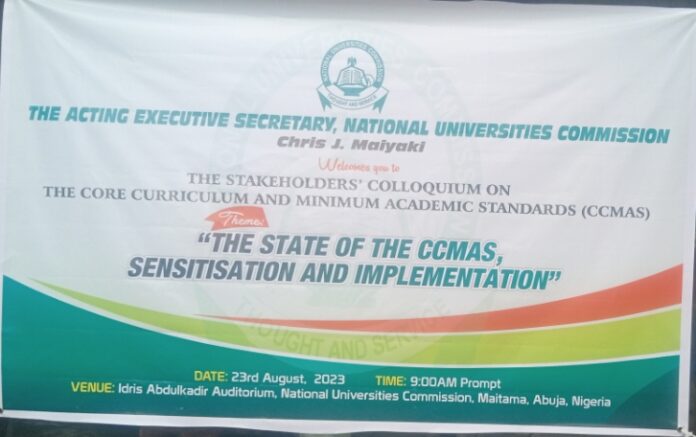The Executive Secretary of the National Universities Commission, NUC, Mr. Chris Maiyaki, has said the implementation of the Core Curriculum Minimum Academic Standards (CCMAS) will begin by September 2023.
Addressing newsmen in Abuja, Maiyaki said the CCMAS document is expected to guide institutions in the design of curricula for their programmes while bringing necessary innovation into the content and delivery of their programmes towards achieving the overall goals of education and training in the country.
Speaking at the Stakeholders’ Colloquium on CCMAS in Abuja on Wednesday, the Acting Executive Secretary hinted that the document would reposition Nigerian universities to be among the best rated in Africa.
Maiyaki said CCMAS would make up 70 per cent of the curriculum while the university decides what to include in the remaining 30 per cent.
According to him, the implementation will help sharpen the future of education sector.
”The role and development of the CCMAS is to ensure commitment in advancing of our education and our great nation.
” NUC is primarily dedicated in ensuring quality and global competitiveness of Nigerian universities as well as the graduate we produce.
” The development of the CCMAS went through painstaking process by bringing experts from our universities comprising of professors, regulatory bodies, Nigerian Economic Summit Group (NESG) and all stakeholders.
‘The CCMAS reflect global initiative that will equip graduates with knowledge and wherewithal that will advance the development of the nation,” he said.
Also speaking, the Minister of Education, Prof. Tahir Mamman, encouraged universities to make optimal use of the 30 per cent university senate’s input.
Mamman advised universities to ensure that learning outcomes, skills as well as soft skills were acquired, irrespective of the core discipline.
He added that the skills must be readily applicable to the environment of the university, the country in particular and the global community in general.
”There is no better place and time than now to develop a strategy that will guide tertiary institutions particularly universities in their mandate to provide appropriate manpower for the country.
”This is through using a curriculum and applying minimum standards that would guarantee we teach our students in such a way and manner that they would be highly skilled and employable to contribute to national development efforts.
” 70 per cent of the total curriculum is captured in the CCMAS while 30 per cent of the curriculum has been ceded to universities Senates to build in the uniqueness of their various universities.
”This principle allows for a good deal of adaptation that suits not only local peculiarities of the universities but provides universities opportunities to carve a niche for themselves in areas of comparative advantage,” he said.
The minister commended universities who had concluded their work on the 30 per cent component and submitted same for review.
He also urged those who have not to endeavour to do so in the shortest possible time as the next academic session rolls in.
He pledged the commitment of the Federal Government in ensuring that our education system remained nationally relevant and globally competitive.
In his keynote address, Former Vice Chancellor, Obafemi Awolowo University, Ile-Ife, Prof. Michael Faborode said the idea of the CCMAS was to promote diversification and differentiation in the system.
This he said was to provide proper conceptual administrative guidelines and a harmonised legal framework for higher education.
Faborode commended the over 70 per cent universities that had already complied with the uploading of their 30 per cent curriculum inputs into the CCMAS.
He said this was the way to go so that universities could be globally relevant and competitive and as well provide the educational needs to the students so they could be employable after graduation.
Daily Champion reports that the CCMAS was developed in 2018 following the review of the Benchmark Minimum Academic Standards (BMAS) –the curriculum guide for Nigerian universities, which had been in use since 2007.
The CCMAS also expanded BMAS from 12 to 17 disciplines to reposition the system to reflect the realities of the 21st century.
The 17 disciplines are Administration and Management, Agriculture, Allied Health Sciences, Architecture, Arts, Basic Medical Sciences, Communication and Media Studies, Computing and Education.
Others are Engineering and Technology, Environmental Sciences, Law, Medicine and Dentistry, Pharmaceutical Sciences, Sciences , Social Sciences and Veterinary Medicine.























